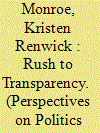|
|
|
Sort Order |
|
|
|
Items / Page
|
|
|
|
|
|
|
| Srl | Item |
| 1 |
ID:
110625


|
|
|
|
|
| Publication |
2011.
|
| Summary/Abstract |
My talk honors the contribution of Ithiel de Sola Pool to empirical political theory, a field pioneered by Pool, David Easton, and Gabriel Almond, inter alia. Pool's 1967 edited volume, Contemporary Political Science: Toward Empirical Theory illustrates some of the important early works in this field, a field designed to generate political theory from the systematic examination of empirical data. To demonstrate the kind of work Pool developed, I begin my talk by suggesting what studying altruism and genocide taught me about broader themes in political, social, and moral theory. I then suggest how I developed a new theory of moral choice in order to explain the surprising finding that identity trumped choice for all the participants I interviewed about their actions during the Holocaust and World War II, from Nazis and bystanders to rescuers of Jews. This paper thus summarizes the highlights of the 2010 Pool Lecture to provide a few illustrations of the empirical findings that led me to develop an identity-based theory of moral choice.
|
|
|
|
|
|
|
|
|
|
|
|
|
|
|
|
| 2 |
ID:
096387


|
|
|
|
|
| Publication |
2010.
|
| Summary/Abstract |
As part of the ongoing work by the Committee on the Status of Women in the Profession (CSWP), we offer an empirical analysis of the pipeline problem in academia. The image of a pipeline is a commonly advanced explanation for persistent discrimination that suggests that gender inequality will decline once there are sufficient numbers of qualified women in the hiring pool. The CSWP believes that it is important to ask whether this phenomenon is actually occurring, because the implication is that we can explain inequality as a function of insufficient numbers of trained women in the pool, rather than as a result of ongoing discrimination that requires alternate remedies. Data from the American Association of University Professors suggests that merely increasing the pool of qualified women has not led to a commensurate number of women rising to the top in academia. Women are still ending up in lower paid jobs, and they continue to earn less than men in comparable positions. More aggressive policies to end discrimination are required.
|
|
|
|
|
|
|
|
|
|
|
|
|
|
|
|
| 3 |
ID:
131685


|
|
|
| 4 |
ID:
096206


|
|
|
|
|
| Publication |
2010.
|
| Summary/Abstract |
Why are differences so political significant? Too often political science discussions of differences assume they are immutable. The attendant implication is that the political divisions attached to these variations-in religion, ethnicity, race, or any of the other dissimilarities that frequently enter political life-are considered rigid and inflexible. This commentary draws on recent work in moral and social psychology and evolutionary biology to suggest that the critical political factor surrounding differences is not their immutability but rather the moral and political salience we accord such differences. Simple experiments in social identity theory-and a conversation with an incensed 12-year old-demonstrate that the psychological process by which differences between people and groups become deemed ethically and politically relevant is totally socially constructed and hence can be restructured in a fashion that leads to more tolerant treatment of those judged different.
|
|
|
|
|
|
|
|
|
|
|
|
|
|
|
|
| 5 |
ID:
159485


|
|
|
|
|
| Summary/Abstract |
What is the impact of the recent Data Access and Research Transparency (DA-RT) initiative and the Journal Editors Transparency Statement (JETS) on scholars working with qualitative data? Analysis finds DA-RT insufficiently sensitive to the needs of qualitative data and focuses on four inter-related reasons why DA-RT needs to be revised before being widely adopted by political science journals: (1) space constraints that hinder full journal presentation of the analysis of qualitative data; (2) ethical concerns about protecting human subjects, and the time needed to prepare such data before publicly sharing them; (3) costs of data collection and the right of first usage; and (4) a potentially chilling effect of DA-RT on certain types of research topics. Analysis of the author’s own journey from econometric and survey analysis to narrative interviews with people in vulnerable situations, facing moral dilemmas, illustrates why DA-RT needs additional safeguards for qualitative data and methods. Given the increasing importance of qualitative data, and its ability to lend insight into critical political topics, the author argues that implementing the current version of the DA-RT initiative could hinder political science’s ability to address important political questions. Thus DA-RT must be modified to address the special needs of qualitative data.
|
|
|
|
|
|
|
|
|
|
|
|
|
|
|
|
| 6 |
ID:
100827


|
|
|
|
|
| Publication |
2010.
|
| Summary/Abstract |
In this article, we speak to two of the Perestroika movement's contributions to political science: heightened awareness of (1) the need for a more catholic approach to methods and (2) the increased sensitivity to the special demands of international cross-cultural research. We make several suggestions here that address each of these topics.
|
|
|
|
|
|
|
|
|
|
|
|
|
|
|
|
| 7 |
ID:
100850


|
|
|
|
|
| Publication |
2009.
|
| Summary/Abstract |
We contribute to a greater understanding of political psychology by 1) collecting data in a more systematic way for the intellectual community, 2) sensitizing students to the extent to which any intellectual discipline is socially constructed and is a work in progress, 3) heightening awareness of the political aspects of intellectual life, 4) exposing readers to the wide variety of diverse approaches and methodologies utilized by political psychologists, and 5) suggesting the range of topics that political psychology can address successfully and the range of techniques it can utilize.
|
|
|
|
|
|
|
|
|
|
|
|
|
|
|
|
|
|
|
|
|